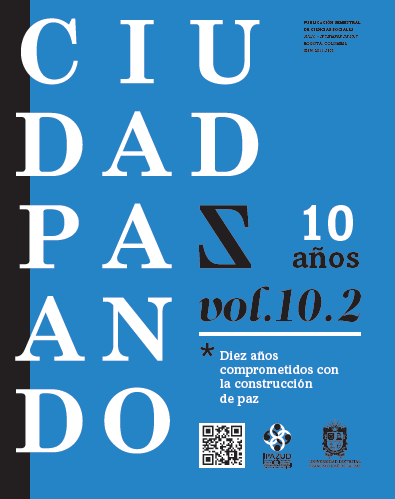DOI:
https://doi.org/10.14483/2422278X.12798Published:
2017-12-31Issue:
Vol. 10 No. 2 (2017): Julio - diciembre. Diez años comprometidos con la construcción de pazSection:
Dossier centralGeopolítica de las emociones. Narrativas de maestras sobre conflicto armado y construcción de paz en la escuela
Geopolitics of emotions. Narratives of teachers about armed conflict and peace building in school
Keywords:
armed conflict, emotions, geopolitics, peace, school (en).Keywords:
conflicto armado, emociones, escuela, geopolítica, paz (es).Downloads
Abstract (es)
Este artículo pretende realizar una reflexión en torno al papel de las emociones en la permanencia del conflicto armado y en la construcción de paz desde la escuela; en este sentido, inicialmente se realiza una exploración sobre los conceptos de emociones políticas, geopolítica y conflicto armado, después se alude a la narrativa como forma de investigación social y para finalizar se hace referencia al contexto y a las alternativas pedagógicas ideadas por las maestras con el fin de promover una educación para la paz.
Abstract (en)
This article intends to reflect on the role of emotions in the permanence of the armed conflict and in the construction of peace from school, initially an exploration is made of the concepts of political emotions, geopolitics and armed conflict, then refers to the narrative as a form of social research and, finally, reference is made to the context and pedagogical alternatives devised by the teachers to promote an education for peace.
References
Barthes, R. (2001). Introducción al análisis estructural del relato. México: Ediciones Coyoacán.
Centro Nacional de Memoria Histórica. (2016). La justicia que demanda memoria. Las víctimas del Bloque Calima en el suroccidente colombiano. Bogotá D.C.: Autor.
Maíz, R. (2010). La hazaña de la razón: la exclusión fundacional de las emociones en la teoría política moderna. Revista de estudios políticos, 149, 11-45.
Moisi, D. (2010). La geopolítica de las emociones: como las culturas del miedo, la humillación y la esperanza están reconfirmando el mundo. Bogotá D.C.: Grupo Editorial Norma.
Nussbaum, M. (2014). Emociones políticas. Porque el amor es importante para la justicia. España: Editorial Paidós.
Ricœur, P. (2004), La memoria, la historia, el olvido. Ciudad de México: Fondo de Cultura Económica.
How to Cite
APA
ACM
ACS
ABNT
Chicago
Harvard
IEEE
MLA
Turabian
Vancouver
Download Citation
License
The Ciudad Paz-ando Journal (RCP) is an open access publication, without economic charges for authors or readers, whose biannual publications are made under the terms of the Creative Commons Attribution - Non-commercial - Share the same License (CC-BY-NC -SA 2.5 CO), with which others may distribute, remix, retouch, and create from the work in a non-commercial way, as long as they give credit and license their new creations under the same conditions.
The copyright holder is Ciudad Paz-ando journal, retaining all rights without restrictions, respecting the terms of the license regarding the consultation, download and distribution of the material.
When the work or any of its elements are in the public domain according to the applicable current law, this situation will not be affected by the license.
Likewise, we encourage authors to deposit their contributions in other institutional and thematic repositories, with the certainty that culture and knowledge is a good for all and for all.

